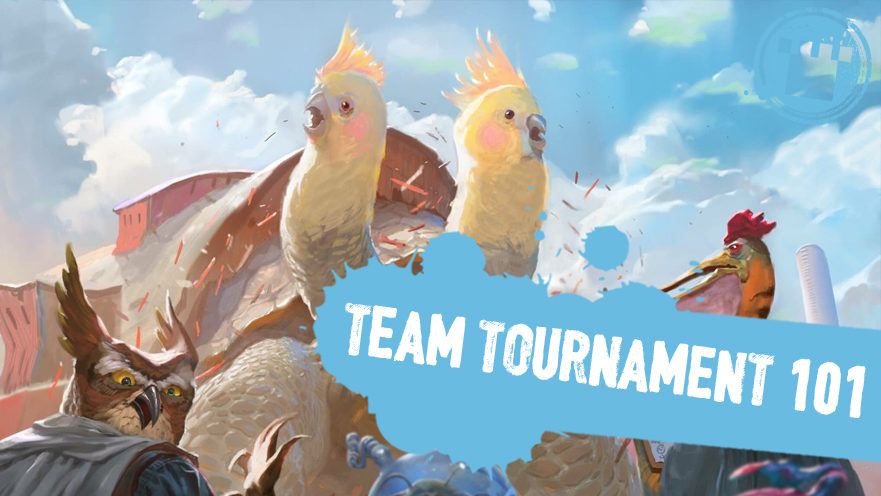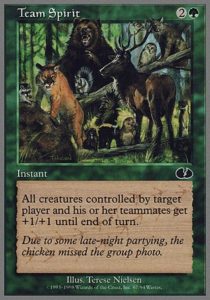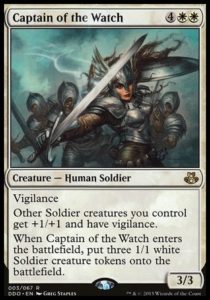2018 promises to be The Year of the Team Tournament for Magic. This past weekend, Wizards kicked off the year with a team Grand Prix in Santa Clara, CA, and there are fourteen more premier-level team events coming up, including the 25th Anniversary Pro Tour in Minneapolis, MN. Players can compete in Team Limited, where they’ll build three Sealed decks from twelve booster packs; Team Unified Modern, where teammates bring three distinct Modern decks with no shared cards; and Team Trios Constructed, where teammates play Standard, Modern, and Legacy, respectively.
As exciting as it can be to compete alongside our friends, many of us are used to playing Magic solo, so playing in team events can be an adjustment. In one-on-one Magic, your decisions only affect you and your game; in a team format, every decision you make will affect your teammates. That may seem like a lot of pressure, but with the right team in your corner, you should have a fun and successful experience.
Here are some tips for players looking to compete in their first team event.
Evaluate your goals first.
Before you even start thinking about potential teammates, you should do a quick self-assessment. Why are you playing in this event, and what do you want to get out of it? Do you have a specific goal in mind, or are you just playing for fun? Be honest with yourself, and keep your answers in mind as you start preparing for the tournament.
Choose teammates with whom you’ll work well.
Now that you’ve set your goals for the tournament, it’s time to find two teammates who share and support them. If you belong to a regular playgroup or have had good experiences playing in Two-Headed Giant tournaments at your local store, you probably won’t have a hard time finding good teammates. If not, consult your closest friends or family, prioritizing those with whom you know you can disagree respectfully. Teaming up for a tournament may test your relationship in new and uncomfortable ways, so be prepared to address any potential conflicts and don’t feel obligated to team up with someone just because you’re friends. Some friends work very well independently of one another, but have different styles that can put them at odds in team events.
You’ll also want to be aware of your friends’ needs and habits when you’re at the tournament. Is your friend likely to fall into a social media spiral when he checks his phone between rounds and have trouble concentrating on the next match as a result? Ask him to put his phone in airplane mode during the tournament. Does your friend tend to get cranky when she hasn’t eaten in a while? Make sure to pack extra snacks. Be aware of how your teammates take losses, what helps them, and what doesn’t. (If you aren’t sure, ask!) In short, take care of your friends, and be sure to take care of yourself and let your friends know if you need anything, too.
Have a frank discussion with your team about everyone’s expectations.
Before you even register for the event or book your travel, make sure you’re all on the same page about what you want to get out of the event and how you’ll react in different situations. How will you handle disagreements? How long will you continue to play in the event if you have a losing record? How can you best support each other as teammates? If things are going well, go ahead and make your travel arrangements; if you’re getting some red flags, you may want to consider finding new teammates.
Appoint a team captain.
In Team Limited or Unified Constructed tournaments (i.e. when all members of the team are playing the same format), it’s common for the strongest player on a team to sit in the middle or “B” seat at the table, so they can watch over the other two games and offer advice on mulligans and plays. This person is often referred to as the team captain, and they can serve a vital role on any team, even if all three of you are just there to play for fun. If your team has a captain, you should agree to give the captain final say in team decisions – that way, if you can’t agree on the last card for your sideboard or which Sealed deck has the greatest need for Evolving Wilds, the captain can decide and you can quickly move on to the next matter before the discussion gets too heated.
As a former Team Limited team captain, I also have a couple pieces of advice for aspiring B-seaters. Listen to your players’ points, but be decisive once you’ve heard them out. Emphasize that this is a team tournament – do not heap blame on a teammate, and discourage your teammates from blaming each other or themselves. I also once convinced my teammates to drop from a tournament once we were out of Day 2 contention, even though I would’ve liked to keep playing, because it was clear they’d had enough but didn’t want to admit it. Always do what’s best for the team, even if you wouldn’t do the same thing in a one-on-one tournament.
Communicate, communicate, communicate.
Communication is key to success in any team tournament. You’ll want to make sure you communicate with your teammates frequently in the months leading up to the event, practicing together if you’re playing the same format and checking in if you’re playing different ones. Share ideas, engage in respectful debate, and formulate team conclusions on the format and/or the specific decks you’ve chosen. Check in and make sure that everyone feels comfortable with their chosen decks. Also, confirm that everyone has travel and hotel accommodations booked ahead of time, and that everyone’s passport is up-to-date if you’re traveling abroad.
I’ve had some of my most rewarding Magic experiences playing in and preparing for team Grand Prix, and I hope this guide helps you find success at your next team event. I’m planning on hitting at least one team tournament this year, and I look forward to forging deeper connections with some of my friends in the Magic community. Hope to see you there!
Header design: Justin Treadway
Header image: “Better Than One” by Alex Konstad

Hallie served as Content Manager for CardKingdom.com and editor-in-chief of the Card Kingdom Blog from 2017-2022. Part tournament grinder, part content creator, Hallie is always looking for ways to improve her game and to share what she learns with others.



